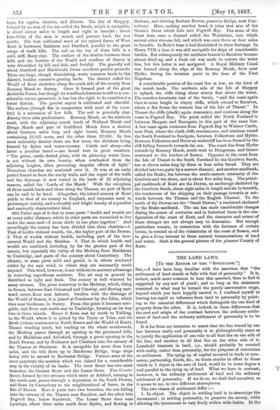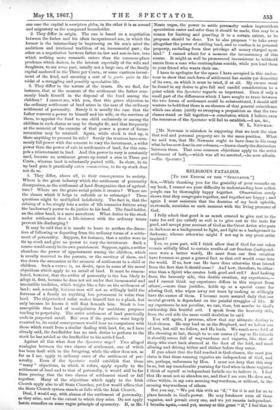THE LAND LAWS.
[To THE EDITOR OF THE " SPECTATOR.") SIR,-I have been long familiar with the assertion that "the settlement of land stands or falls with that of personalty." It is, indeed, much more common to hear this asserted, than to find it supported by any sort of proof ; and so long as the statement remained in what may be termed the purely asseverative stage, beyond which you have happily carried it, I confined myself to barring too rapid an inference from land to personalty by point- ing to the essential differences which distinguish the one kind of property from the other. It is, indeed, in these differences that. the root and origin of the contrast between the ordinary settle- ment of land and the ordinary settlement of personalty is to be- found.
It is far from my intention to assert that the line traced by our law between realty and personalty is so philosophically exact as justify the application of one rule to all that lies on one side of the line, and another to all that lies on the other side of it. Leasehold interests in land, e.g., should probably be counted with realty, rather than personalty, for the purposes of restriction. on settlement. The tying up of capital invested in trade or com- merce, partnership, funds, &c., on trusts similar in effect to those which to I object in the case of land, would be in some degree a real parallel to the tying up of land. What we have to contrast, however, is the ordinary settlement of laud and the ordinary settlement of personalty. If we do so, we shall find ourselves, as it seems to me, in two different atmospheres.
The two classes of settlement differ :- 1. In object. The object in settling land is to stereotype the investment ; in settling personalty, to preserve the money, while allowing the investment to vary freely within wide limits. In the one case the capital is asoriptum glebre, in the other it is as nomad and migratory as the compound householder.
2. They differ in origin. The one is based on a negotiation between the father and his often inexperienced son, in which the former is the intermediary in impressing on his son's mind the ambitious and irrational tradition of an immemorial past ; the other on a negotiation between father-in-law and son-in-law, into which nothing more romantic enters than the common-place prudence which desires, in the interest especially of the wife and daughters, to see some part, usually not a large one, of the family capital anchored in the Three per Cents., or some cautious invest- ment of the kind, and securing a sort of in portu quies in the midst of a struggling and possibly speculative life.
3. They differ in the nature of the trusts. Do we find, for instance, that at the moment of the settlement the father com- monly binds himself in the disposal of the fund among the children? I cannot see, with you, that this grave objection to the ordinary settlement of land arises in the case of the ordinary settlement of personalty. Surely it is usually the case that the father reserves a power to himself and his wife, or the survivor of them, to appoint the fund to one child exclusively or amongthe children in such shares as may be thought fit, and that frequently at the moment of the exercise of that power a power of future revocation may be retained. Again, while stock is tied up, is there anything to prevent its sale? Surely the trustees have com- monly full power with due consent to vary the investment, a wider power than the power of sale in settlements of land, for this com- pels a reinvestment in land. And this power to vary is constantly used, because no sentiment grows up round a sum in Three per Cents., whereas land is reluctantly parted with. In short, to tie up land puts it practically extra commercium, to tie np stock does not do so.
4. They differ, above all, hi their consequences to society. Where is the great industry which the settlement of personalty disorganizes, as the settlement of land disorganizes that of agricul- ture? Where are the grave social points it creates? Where are the classes which it helps to enfeeble or to submerge? These questions might be multiplied indefinitely. The fact is, that the coining of a fee simply into a series of life tenancies fritters away the landowner's power to do justice to his land. The fund holder, on the other hand, is a mere annuitant. What duties to the stock under settlement does a life-interest with the ordinary trusts prevent his discharging?
It may be said that it is unsafe to leave to settlers the discre- tion of following or departing from the ordinary terms of a settle- ment of personality. Suppose, for instance, that a settler were to tie up stock and give no power to vary the investment. Such a course would surely be its own punishment. Suppose, again, a settler abandons the power of appointment among the children, which is usually reserved to the parents, or the survivor of them, and ties down the succession at the moment of settlement to a child or children. Such a course is, no doubt, open to some of the moral objeCtions which apply to an entail of land. It must be remem- bered, however, that the settler of personalty is the less likely to adopt it, first, because he does not act under that immemorial and irresistible tradition, which weighs like a fate on the settlement of land ; and, secondly, because man will not so willingly build the fortunes of a family on anything less permanent in value than land. The shipwrecked sailor makes himself fast to a plank, but only because he knows it will float beneath him. Stock is less susceptible than land of manipulation for ambitious purposes tending to perpetuity. The strict settlement of land practically ends in perpetual entail. But even if the practice were largely resorted to, its social consequences would bear no comparison with those which result from a similar dealing with land, for, as I have already said, the fundholder has no such duties to perform to the stock he has settled as the landholder to his settled land.
Against all this what does the Spectator urge? Two alleged analogies between the two classes of settlement, one of which has been dealt with in the foregoing, while the other does not, as far as I see, apply to ordinary cases of the settlement of per- sonalty. Even if the Spectator could establish that those " many " objections, to which it refers, apply equally to the settlement of land and to that of personalty, it would still be far from proving that the two classes of settlement stand or fall together. Many of the objections which apply to the Irish Church apply also to all State Churches, yet few would affirm that the State Church system stands or falls with the Irish Church.
Deal, I would say, with abuses of the settlement of personalty, as they arise, and to the extent to which they arise. Do not apply heroic remedies on some vague principle of symmetry. If, as Mr.
Neate urges, the power to settle personalty makes improvident speculation easier and safer than it should be made, that may be a reason for limiting and guarding it to a certain extent, as he proposes should be done. Yet he also proposes " to take away altogether the power of settling land, and to confine it to personal property, excluding from that privilege all money charged upon land." I cannot admit for a moment the inconsistency of this course. It might as well be pronounced inconsistent to withhold razors from a man who contemplates suicide, while you lend them to your friend who wants their use.
I have to apologize for the space I have occupied in this endea- vour to show that each form of settlement has merits (or demerits) of its own, on which it must be tried, if at all. My excuse must be found in my desire to give full and candid consideration to a point which the Spectator regards as important. Even if only a small part of the differences which I have sought to trace between the two forms of settlement could be substantiated, I should still venture to hold that there is an absence of that general coincidence which can alone justify so sweeping a proposition as that the two classes stand or fall together—a conclusion which I believe even the resources of the Spectator will fail to establish.—I am, &c.,
W. L. NEWMAN.
[Mr. Newman is mistaken in supposing that we took the view that real and personal property are in the same position. What we said was, that Mr. Newman ought to have done in his essay what he has now done in our columns,—drawn clearly the distinction between them. That some common objections apply to the strict settlement of both,—which was all we asserted,—he now admits. —ED. Spectator.]































 Previous page
Previous page